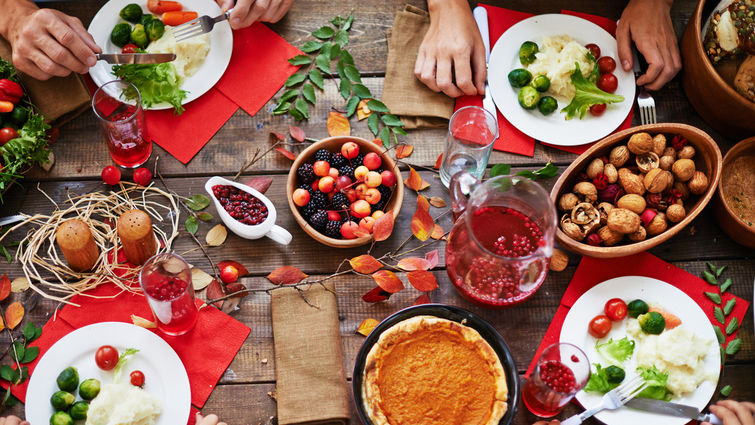
Healthy Vegetarian Thanksgiving Meal
Many people during the upcoming holiday season are likely to have stressors in their lives, which include keeping bank accounts steady, stress levels low and waistlines under control.
Weight gain begins to rise in the United States throughout October and November, peaking approximately 10 days after Christmas, according to a study in the The New England Journal of Medicine. On average, a person’s weight increases nearly a pound and a half during the holiday season.
While the average weight gain numbers aren’t large, Olivia Moses, DrPH, director of Corporate Health and Wellness at Loma Linda University Health, says the issue is gradual long-term weight gain from unhealthy holiday binging.
“During the holidays, we’re in celebration mode, making it very easy to gain a few pounds,” Moses says. “The problem is we often never lose the excess weight, and year after year, we continue with the same routine.”
The goal for the holidays is to celebrate AND keep your health in mind, Moses says.
Here are some Do’s and Don’ts to survive healthfully through the holidays:
Don’t completely restrict yourself.
Celebrate with their family and friends. “You don’t need to sit there with a salad while everyone is indulging on wonderful holiday food,” Moses says.
Do keep your indulgence to a minimum during the holiday season.
“If you know you’re going to have a Thanksgiving meal at your family’s house, only indulge at that one Thanksgiving meal,” Moses says. “Before and after that, try to eat healthy at every other get-together or work event.”
Do eat your favorite things only.
Choose foods carefully at parties and buffets. To avoid overeating, it’s helpful to scout the buffet to know what is available, Moses says. Choose foods you love and also some you know are both healthy and delicious. If you want to have a treat, only select the one you enjoy most.
Don’t drink your calories.
While it might be tempting to have that extra mug of hot chocolate or apple cider, you can greatly reduce your total calories consumed during the holiday season by limiting juices, sodas and other calorie-filled beverages. Instead, save your calories for the food items you love, which will also provide some nutritional benefit. Moses recommends staying hydrated in-between meals with water instead.
Do bring your own dish of food.
“If you don’t know what kind of food will be at a get-together, bring a dish you won’t feel guilty eating,” Moses says.
Don’t go into Thanksgiving Day celebrations with an empty stomach.
Moses suggests that eating breakfast the day of Thanksgiving can be helpful. A fuller stomach will help you make more mindful choices since you won’t be overly hungry.
Do go for a walk with your family.
“We tend to all be sluggish before and after our Thanksgiving celebration,” Moses says. “Staying active with a leisurely walk will not only help burn off some post-meal calories, but it can also be a nice family activity.”
Don’t keep any leftovers.
“If you’re hosting the meal, get rid of all the leftovers after the celebration,” Moses says. “People love taking food with them, and you won’t be tempted to keep indulging on the same holiday treats if you don’t have any left.”
Visit the Living Whole website for nutritious and delicious recipes for breakfasts, entrees, desserts and more.
